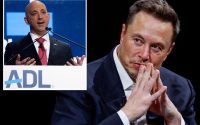Boeing executives unlikely to be charged in 737 MAX crashes that killed 346 people
New York – Boeing executives are unlikely to be criminally charged over fatal crashes in 2018 and 2019 that killed 346 people as the statute of limitations has likely passed, U.S. Justice Department officials told victims’ family members in a meeting.
Details were corroborated by a person familiar with the gathering on Friday and correspondence reviewed by Reuters.
The deadline for prosecuting most federal crimes is five years.

The Justice Department found in mid-May that Boeing violated a 2021 deferred prosecution agreement (DPA) that had shielded the company from a criminal charge arising from the fatal crashes.
Officials agreed to ask a judge to dismiss the charge of conspiring to defraud the U.S. Federal Aviation Administration (FAA) as long as Boeing abided by the terms of the agreement over a three-year period ending Jan. 7, 2024.
But an in-flight blowout two days before the agreement expired exposed ongoing safety and quality issues. A panel blew off a new Boeing 737 MAX 9 jet during a Jan. 5 Alaska Airlines flight.
Boeing has until June 13 to outline any disagreements with the department’s finding that it violated the 2021 agreement.

Officials have until July 7 to inform a federal judge in Texas of its plans.
“We have honored the terms of the agreement,” Boeing said in a statement on Saturday.
The Justice Department did not immediately respond to a request for comment.
Catch up on Boeing’s ongoing airplane fiasco
Boeing has recently been plagued by safety concerns that began Jan. 5 after a door panel blew off a Boeing 737 MAX 9 jet during a flight from Oregon to California. According to the National Transportation Safety Board, the plane — which was operated by Alaska Airlines — appeared to be missing four key bolts.
Scott Kirby, CEO of United Airlines, threatened to shun Boeing after the carrier’s fleet of MAX 9 aircraft was grounded in the wake of the near-disastrous Alaska Airlines door blowout.
Jennifer Homendy, chair of the National Transportation Safety Board, warned that another midair door blowout like the Boeing 737 MAX 9 fiasco “can happen again,” adding there was a “problem with the process” of production.
Disaster struck again a week after the initial incident when a Boeing plane was forced to make an emergency landing in Japan due to a crack in the cockpit window.
A Boeing 757 lost its front tire as the aircraft was preparing to depart for an international flight in late January. At Atlanta International Airport, a Delta flight bound for Bogota, Colombia, was taxiing across the runway into takeoff position when another plane alerted the control tower that something was amiss.
Later, a UK passenger was alarmed after noticing pieces of tape on the exterior of a Boeing 787 during a flight to India, as seen in shocking photos.
A United Airlines Boeing 777-300 aircraft suffered a midair fuel leak and was forced to make an emergency landing Monday, March 11, marking the fifth incident the airline reported in a little over a week.
Ryanair CEO Michael O’Leary previously said he’s made “loud complaints” to Boeing over quality control.
Whistleblower John Barnett raised safety concerns at the airline’s factories and provided his first testimony at a bombshell lawsuit against Boeing. He was found dead in his truck after he failed to show up for the second part of his testimony on Monday.
The department is weighing several options, including whether to prosecute Boeing or extend the DPA by a year. Officials could also enter into a new DPA or reach a non-prosecution agreement that does not involve court supervision.
Officials could also seek to negotiate a plea deal with Boeing over the 2021 fraud charge or take the company to trial over it.
Boeing could also face charges over its behavior during the three-year term of the DPA, though officials have not found evidence of any felonies committed during that period, prosecutors told the victims’ families, according to the source familiar with meeting.
Victims’ family members are discussing asking officials to seek an enhanced sentence should Boeing be prosecuted and convicted, the source told Reuters.
In the meeting, Justice Department officials said they believe they are unable to prove cases of federal manslaughter or fraud involving aircraft parts beyond a reasonable doubt, the person added.


